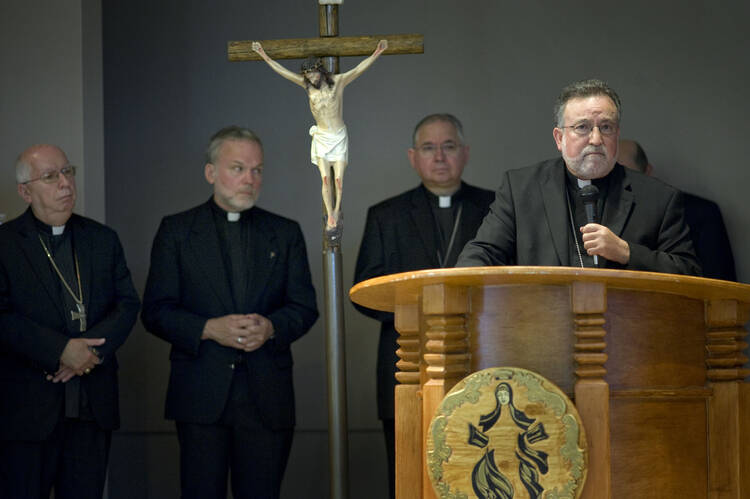Three bishops weighed in on the ongoing congressional debate on immigration reform legislation June 10, warning against amending a Senate bill in ways that would block the path to legalization for undocumented immigrants.
At a news conference in San Diego, held as the U.S. Conference of Catholic Bishops opened its annual spring meeting, the chairmen of three committees reiterated the bishops' support for comprehensive immigration reform that protects families and workers.
"Each day in our parishes, social service programs, hospitals and schools, we witness the human consequences of a broken immigration system,” said Los Angeles Archbishop Jose H. Gomez, chairman of the USCCB's Committee on Migration. "Families are separated, migrant workers are exploited, and our fellow human beings die in the desert."
He called the status quo morally unacceptable, adding, "This suffering must end."
Bishop John C. Wester of Salt Lake City, chairman of the Committee on Communications and former chair of the migration committee, specified a handful of concerns for changes to the bill that might be attempted on the Senate floor. The Senate began debate on the bill the previous week and was scheduled to take a procedural vote over whether to allow debate to continue June 11. A panel of House members was reportedly still working on a version of a bill for that chamber.
"Some will argue that before we can begin welcoming new citizens, we will need more fencing and blockading of the border," Bishop Wester said. "However, making the legalization program contingent upon border metrics that are practically impossible to achieve would effectively prevent the undocumented from ever becoming citizens, or even legal residents. Such a step would render the immigration reform program useless and the bill not worth supporting.
"We urge Congress to maintain the current balance between enforcement goals and improvements in the legal immigration system, including a path to citizenship."
He said the bishops also would oppose amendments to reduce the number of people who might pursue the path to citizenship laid out in the bill, S. 744. "Additional measures to make the path to citizenship more difficult, such as an increase in fines or imposition of other difficult income and employment requirements, or amendments to remove the citizenship option altogether, also will meet our opposition."
Bishop Wester said efforts to prevent immigrants in the legalization program from obtaining benefits such as the earned income tax credit, Social Security and eligibility for health care coverage also would meet the church's opposition.
People who pay taxes and otherwise contribute to the economy "should not be barred from these benefits, to which every worker should be entitled," he said.
Bishop Wester said he hopes the legislative process would lead to improvements in the Senate bill, not additional restrictions.
Bishop Jaime Soto of Sacramento, a member of the board of directors of the Catholic Legal Immigration Network, warned that attempts to reform the immigration system would fail if they don't allow for immigrants to fully incorporate into American society.
He said the key points of the bishops' policy goals for immigration reform include:
• An accessible and achievable path to citizenship that includes the maximum number of people. If the goal of reform is to address the problem of irregular immigration in a humane manner, he said, then all undocumented people should be brought out of the shadows and placed into the new system. "Leaving a large group behind does not solve the problem, and in the future, could create new ones."
• Family unity as the cornerstone of the system. "Immigrant families help our nation both economically and socially" he said. "This nation cannot take an immigrant's labor and deny the immigrant's family."
• "Enforcement by itself, especially along our southern border, will not solve the challenge of irregular immigration," said Bishop Soto. "The punitive enforcement-only approach has been the default policy for the last two decades. It has only aggravated the problem of irregular immigration. Our southern border should be a place of mutual support and an extension of hands across boundaries, not a militarized zone. Sadly, many of our elected officials see more enforcement along our border as the sole solution to irregular migration. We oppose the acceleration of border enforcement as a prerequisite for a legalization program that includes citizenship. An effective legalization program with a path to citizenship will lead to more effective border management."
Bishop Soto said that it's important to consider why people risk their lives to come to the United States, and how to address global poverty and persecution.
Archbishop Gomez said as the debate continues, the nation must answer several questions:
"Do we want a country with a permanent underclass, without the same rights as the majority? Do we want to continue to separate children from parents, creating a generation of young U.S. citizens who are suspicious and fearful of their government? Do we want a nation that accepts the toil and taxes of undocumented workers without offering them the protection of the law?"
"The answer to these questions, of course, is a resounding no," said Archbishop Gomez.








